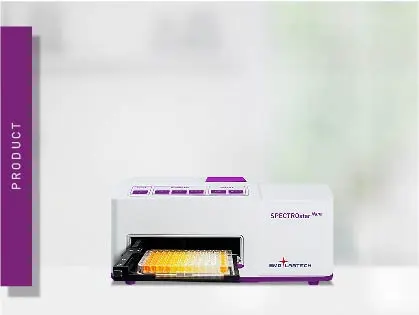
SPECTROstar Nano
Absorbance plate reader with cuvette port
By now you have probably heard that this years Nobel Prize in Physiology or Medicine was shared by James P. Allison and Tasuku Honjo for their independent breakthroughs in the field of immunotherapy for the treatment of cancers.
 Dr Carl Peters
Dr Carl Peters
Immunotherapy is basically any treatment that helps our body's own defense system to do a better job of eliminating things that are harmful to us, such as cancer cells. It seems an obvious approach to take but efforts to employ immunotherapy for cancer treatment were of very limited success until the work of Dr. Allison and Dr. Honjo. Both did extensive work to understand how our immune system, specifically our T-cells, is regulated and why cancer cells are not immediately attacked by them.
 T-cells are very effective at destroying cells that they are able to bind to based on recognition of antigen of the surface of these cells. But they need to be prevented from destroying the normal cells in your body so additional regulation is required. Dr.s Honjo and Allison worked on the proteins PD-1 and CTLA-4, respectively, and found that both can serve as an immune checkpoint to stop an activated T-cell from destroying a particular cell.
T-cells are very effective at destroying cells that they are able to bind to based on recognition of antigen of the surface of these cells. But they need to be prevented from destroying the normal cells in your body so additional regulation is required. Dr.s Honjo and Allison worked on the proteins PD-1 and CTLA-4, respectively, and found that both can serve as an immune checkpoint to stop an activated T-cell from destroying a particular cell.
The treatments developed from their work are antibodies that bind to one of the proteins and serve to disrupt the checkpoint allowing the activated T-cells to destroy cells despite the presence of the checkpoint protein. These include Ipilmumab which works on CTLA-4, which is approved for the treatment of advanced melanoma and pembrolizumab that interferes with PD-1 and is approved for several different cancers.
 Stimulation of the immune system in this way is not without adverse side effects. Many have pointed out that these treatments are essentially removing the brakes from the immune system. If you have ever seen a movie or TV show where the brakes of a car are cut you know that this usually ends up in a fiery crash. The effect may not be quite as catastrophic but, cancer immunotherapy treatments have been shown to sometimes attack a patient's normal tissues. This can lead to organ inflammation, diabetes, or rheumatoid arthritis. The hope is to make treatments that are even more specific to a cancer cell type to minimize these adverse effects.
Stimulation of the immune system in this way is not without adverse side effects. Many have pointed out that these treatments are essentially removing the brakes from the immune system. If you have ever seen a movie or TV show where the brakes of a car are cut you know that this usually ends up in a fiery crash. The effect may not be quite as catastrophic but, cancer immunotherapy treatments have been shown to sometimes attack a patient's normal tissues. This can lead to organ inflammation, diabetes, or rheumatoid arthritis. The hope is to make treatments that are even more specific to a cancer cell type to minimize these adverse effects.
Regardless cancer immunotherapy research has become an important tool in cancer treatment and is not limited to the checkpoint inhibitors that resulted from the award-winning work. Indeed, any treatment that helps boost immunity is considered immunotherapy including monoclonal antibodies designed to guide the attack on specific cancer and cancer vaccines to stimulate and immune response.
BMG LABTECH is proud to play a small part in the new/improved cancer immunotherapy research. What follows are just a few recent examples of researchers who used their BMG microplate reader for their studies.
‘Regulation of the effector function of CD8+ T cells by gut microbiota-derived metabolite butyrate’ by Luu et al., studied butyrate (a short-chain fatty acid) which has been shown to have anti-inflammatory capacity. As the title indicates butyrate plays a role in the regulation of CD8+ T cells. Part of this regulation involves the inhibition of histone deacetylase (HDAC) activity. Looks like BMG’s Omega series microplate reader did a great job in their fluorometric HDAC activity assay! The authors propose that HDAC inhibitors could be useful tools to modulate T-cell function to improve anti-cancer effects.
It has also been shown, that cancer cells contribute to immunosuppression in the tumor microenvironment by generating the reactive oxidant peroxynitrite. The application note ‘Production of peroxynitrite by cancer-associated immune cells can be detected with a fluorescence-based assay’ highlights the use of the fluorescent sensor PS3 for the detection of peroxynitrate levels in cells, an important reactive oxidant produced in the tumor microenvironment to promote immunosuppression.
In Senju et al.’s paper ‘Effect of IL-18 on the Expansion and Phenotype of Human Natural Killer Cells: Application to Cancer Immunotherapy’ they used our PHERAstar FS for a time-resolved fluorescence assay of cellular cytotoxicity. Using this they were able to show that natural killer cells could be stimulated to lyse a variety of different cancer cell lines. From this, they conclude that infusing stimulated natural killer cells may be beneficial for patients undergoing other cancer immunotherapies.
As an aside, an alternative approach would have been to use the RealTime-Glo Assay that Drew Niles talked about at SLAS a couple of years ago. Our seminar was called: How to perform real-time, walk-away, cell health assays.

A number of papers recently have dealt with designing better ways to deliver treatments. ‘Cationic Lipid-Associated Nanoparticle for Delivery of mRNA Cancer Vaccine’ by Fan et. al, is an example. A CLARIOstar was used to assess the efficiency of the transfer of mRNA into the delivery particle. The treatment would produce mature dendritic cells that would present a tumor cell antigen to the T-cells. The T-cells activated in this way would have a robust anti-tumor response due to the antigen-specific nature of these T-cells. The results of this study are promising and included tumor prevention in a lymphoma model.
Clearly, there is much that can and will be done to make cancer immunotherapy research more effective and safer. Thanks to Dr. Honjo and Dr. Allison for getting us pointed in the right direction and making these kinds of therapies a reality. Many lives have already been bettered due to their accomplishments and I am sure many more in the future.
Absorbance plate reader with cuvette port
Powerful and most sensitive HTS plate reader
Most flexible Plate Reader for Assay Development
Upgradeable single and multi-mode microplate reader series
Flexible microplate reader with simplified workflows
Microplate readers play an important role in modern day cancer vaccine research. Learn how they can help to prevent and treat cancer in our blog article.